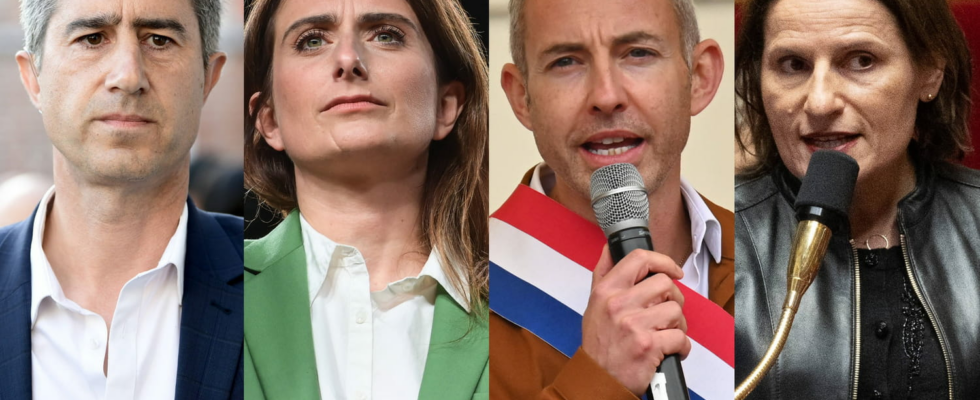After the victory of the New Popular Front in the early legislative elections, which figure could represent the left as Prime Minister? The first leads.
When it was founded, in the wake of the dissolution of the Assembly, the New Popular Front had one goal: to win the legislative elections and form a government between left-wing parties. If the results of the first round seemed to relegate this issue to the background, it could well quickly return to the top of the bill and to the top of the list of issues arising after the second round marked by the victory of the New Popular Front, credited with 182, ahead of Ensemble with 168 and the National Rally with 143. From then on, the arrival of socialist, rebellious, communist and environmentalist figures in ministerial positions seems more than likely. But which personalities could claim a portfolio within the next government?
“Neither François Hollande nor Jean-Luc Mélenchon” has already indicated the Seine-Saint-Denis MP Clémentine Autain, this Sunday, after having distanced herself from the leader of LFI. She also expressed the wish to see the left-wing forces meet “in plenary assembly” as early as this Monday. The latter is also not in favor of the formation of a coalition between the left and the Macron camp. “The NFP program is not compatible with that of Macronie” she indicated. A position shared by the first secretary of the PS Olivier Faure: “A coalition of the opposite would betray the vote of the French”. For his part, Jean-Luc Mélenchon gave his line after the results:“The will of the people must be strictly respected. The president must bow and admit this defeat without circumventing it. The president has the duty to call on the New Popular Front to govern. It is ready for it.”
Marine Tondelier does not close the door to a coalition government
In the absence of an absolute majority for a bloc, Emmanuel Macron and his allies will however probably try to form a coalition, which could end up in government. This, according to the words of Edouard Philippe, could go from “the social-democratic left” to “the liberal and conservative right”. Within the New Popular Front, the Macronists will therefore reach out to the socialists, the ecologists and the communists. Emmanuel Macron has already indicated that he does not want a coalition with La France Insoumise. However, the Insoumis coordinator Manuel Bompard has confirmed that this was not his intention either.
On the other hand, the national secretary of Europe Ecologie Les Verts, Marine Tondelier, did not close the door to the idea of a coalition: “we will surely have to do things that no one has ever done before in this country”, she asked on Tuesday evening on TF1, while affirming that there would be “no Macronist Prime Minister”. Could the ecologists work with the centre and the right? “The question, for me, is more ‘for what purpose’ than ‘with whom'”, added Marine Tondelier, calling for establishing “clear political bases”.
The appointment of an NFP Prime Minister is controversial
From the creation of the New Popular Front, its members have been harassed by the same question: who would be their candidate for Prime Minister? While the left postponed this decision until after the legislative elections, its adversaries undertook to impose the hypothesis of Jean-Luc Mélenchon at Matignon in the minds of voters. “I do not exclude myself but I do not impose myself”, the founder of LFI has constantly repeated, while his partners rejected this possibility one by one.
It must be said that the process of nominating a left-wing Prime Minister remained imprecise: initially, the parties of the New Popular Front seemed to have agreed that the majority group in the Assembly following the legislative elections would propose a candidate. But the First Secretary of the PS, Olivier Faure, then argued for the organization of a vote within the left, to the great displeasure of LFI, which hoped to propose a Prime Minister from its ranks.
Ruffin, Autain and Bompard cited for the post of Prime Minister
Some left-wing figures have said they are “ready” and “capable” of assuming the responsibility of head of government: among the rebels, François Ruffin and Clémentine Autain have opened this door, while Jean-Luc Mélenchon has several times proposed Manuel Bompard, Mathilde Panot and Clémence Guetté. But now that the party has closed the door to any coalition going beyond the left, the presence of these figures in the next government is losing credibility.
That of socialist, environmentalist and communist figures remains more likely: among the socialists, we can cite the outgoing deputies Valérie Rabault and Boris Vallaud, who had said, before the first round, that they were ready to take on Matignon. Among the communists, Fabien Roussel is also a relatively consensual figure, even if his defeat in the first round of the legislative elections would question his legitimacy within a government. It remains to be seen who would agree to govern alongside Macronists, under what conditions, and at the risk of causing the left to explode again… three years before the presidential election.
